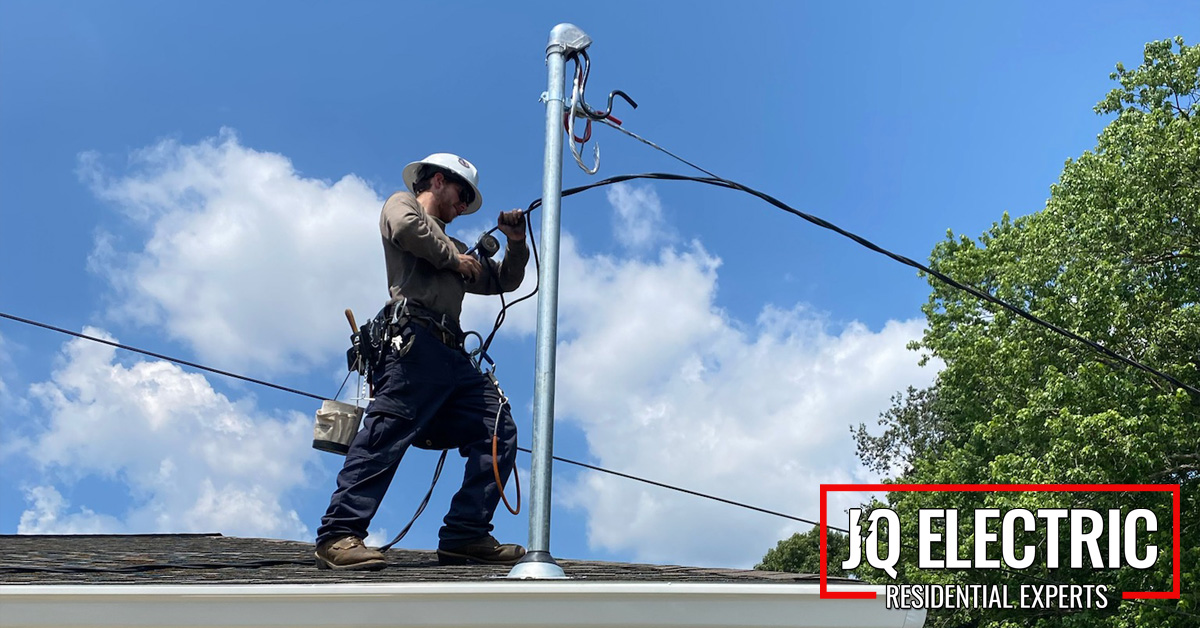
If you’re planning a home renovation or new construction, understanding Maryland’s residential electrical codes is essential. These codes ensure that electrical work meets safety standards and helps protect your home and family from potential hazards. Let’s discuss some key Maryland residential electrical codes and standards, breaking down the essentials you need to know. By the end, you’ll have a better idea of what’s required—and when it’s time to call a professional electrician like JQ Electric, serving Crofton, Maryland.
The Importance of Electrical Codes
Before we dive into the specific codes, let’s start by discussing why electrical codes matter. Electrical codes are designed to prevent accidents, fires, and electrocution by setting guidelines for safe electrical installations. Without these regulations, even small electrical mistakes could result in severe damage or injury. Following Maryland’s electrical codes not only keeps your home safe but also ensures compliance with local regulations. After all, you don’t want any surprises when it comes time for an inspection!
Adopting the National Electrical Code (NEC)
Maryland primarily follows the National Electrical Code (NEC), a widely recognized standard for safe electrical practices. The NEC, updated every three years, covers everything from wiring methods to grounding requirements. Maryland adopts these updates, so staying up-to-date is essential. Notably, each county may enforce additional requirements, so always check with local authorities if you’re unsure.
Key areas the NEC covers include:
- Proper wiring and protection
- Grounding and bonding
- Safe installation of electrical equipment
- Safe power distribution methods
With JQ Electric’s expertise with residential electrical codes, you can be confident that all work aligns with NEC standards and local regulations in the Crofton area.
Key Maryland Residential Electrical Codes
Maryland’s residential electrical codes address various elements, from general wiring to specific installation requirements. Let’s review some of the primary areas covered:
1. General Wiring and Installation
The NEC specifies proper methods for wiring and installing electrical components. In Maryland, you’ll need to ensure that all wiring is properly grounded and that the right wire type is used for each application.
Common requirements include:
- Wire Sizing: Proper wire size depends on the amperage of the circuit. For instance, 14-gauge wire is used for 15-amp circuits, while 12-gauge is required for 20-amp circuits.
- Box Fill Requirements: Electrical boxes must have enough space for all wires and devices. Crowded boxes can lead to overheating and fire risks.
- Conduit and Cable Protection: In Maryland, cables running through walls, floors, and ceilings must be protected with approved conduit materials.
2. Grounding and Bonding
Proper grounding and bonding are crucial for any electrical system. Grounding prevents electrical shock by redirecting stray voltage, while bonding ensures all metallic parts are connected, avoiding dangerous potential differences.
In Maryland, grounding rods or other NEC-approved grounding systems must be installed. Additionally, bonding is required for water pipes, metal structures, and other conductive parts of the home.
3. Circuit Breakers and Panel Requirements
Circuit breakers and electrical panels protect your home from electrical overloads by interrupting power when needed. Maryland requires that all panels meet NEC standards and be accessible and easy to reach.
Some key requirements include:
- Breaker Sizing: Each circuit must have a breaker appropriate for its intended load.
- Panel Location: Panels must be in accessible, well-lit areas. Maryland also mandates a clear area around the panel, so no storage items should block access.
- Arc-Fault and Ground-Fault Circuit Interrupters (AFCIs and GFCIs): Maryland follows NEC standards requiring AFCIs and GFCIs in certain areas of the home to prevent electrical shocks and fires.
4. Code Requirements for Specific Rooms
Maryland’s electrical codes specify standards for specific areas in your home, such as bathrooms, kitchens, and garages.
- Kitchens: Kitchens require GFCI outlets for protection around countertops and water sources. Each appliance also needs its own dedicated circuit to avoid overloads.
- Bathrooms: GFCI protection is required for all bathroom outlets to protect against shocks due to moisture.
- Garages and Outdoor Areas: The NEC requires GFCI protection in garages and outdoor outlets. Additionally, exterior lighting should be weatherproof and properly grounded.
5. Smoke Detectors and Carbon Monoxide Alarms
Maryland requires smoke detectors and carbon monoxide alarms to be hardwired in residential properties. This means these alarms should be connected directly to the electrical system and have battery backup in case of power failure. Smoke detectors are required in every bedroom, hallway, and on each floor of the home.
Ensure smoke and carbon monoxide alarms are installed per Maryland regulations. Hardwiring these alarms adds an extra layer of safety, ensuring they work even if batteries die.
When to Call a Professional
Even small electrical projects can be complex, and Maryland’s residential electrical codes are designed to prevent potential risks. Attempting DIY electrical work without understanding these codes could result in unsafe conditions or code violations. Therefore, for most projects, it’s smart to call in a licensed electrician.
Why choose JQ Electric in Crofton Maryland?
- Expertise: JQ Electric has deep knowledge of Maryland’s residential electrical codes and standards.
- Customer Service: Known for its exceptional service, JQ Electric takes pride in putting customers first.
- Safety: Whether it’s wiring, grounding, or GFCI protection, JQ Electric ensures your home meets all safety requirements.
Need help with Residential Electrical Codes?
In conclusion, Maryland’s residential electrical codes are designed to keep your home safe and efficient. From grounding and wiring to specific room requirements, following these standards is essential. JQ Electric, serving Crofton, Maryland, is here to help with all your electrical needs. Whether you’re tackling a remodel or troubleshooting electrical issues, trust JQ Electric to ensure your home’s electrical system is code-compliant and safe.
